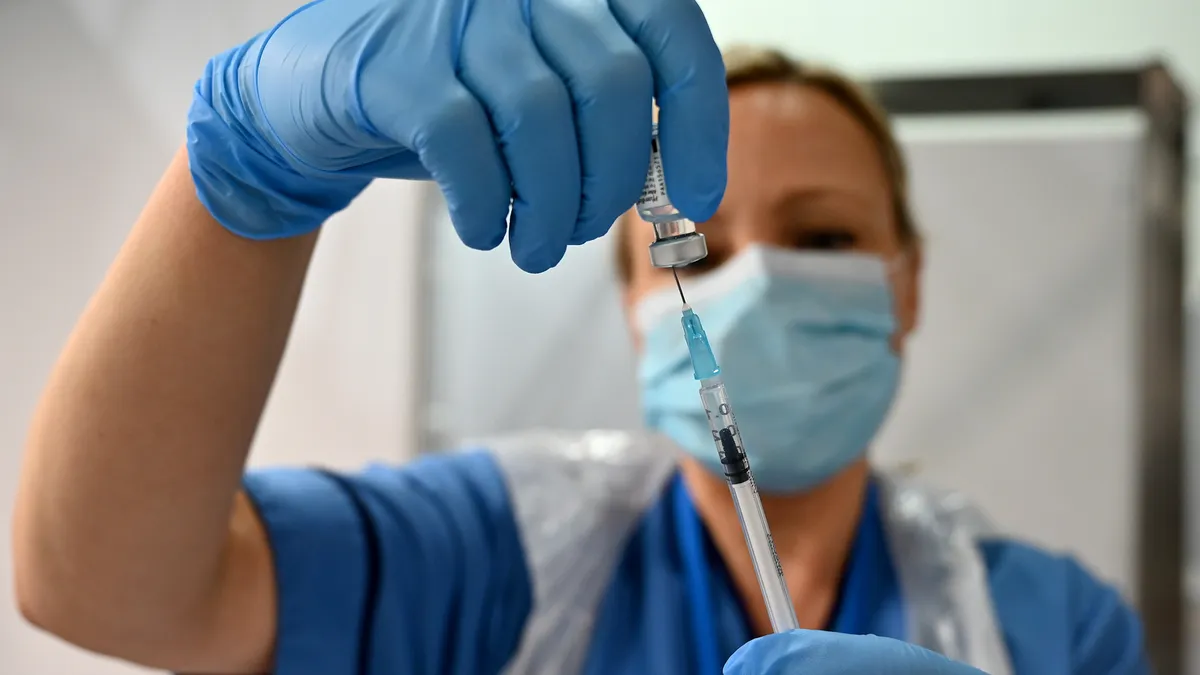UPDATE: Nov. 16, 2021: Western Michigan University will no longer require 16 student-athletes to be vaccinated against the coronavirus to participate as members of various sports teams. They must instead get tested for the coronavirus weekly and wear masks during team activities, according to a lawsuit settlement filed Monday.
The settlement calls for the parties to follow terms from a preliminary injunction the court granted in September. The university also agreed to pay the plaintiff's attorneys fees, which total $34,617.
Dive Brief:
- Western Michigan University won't be able to require a group of student-athletes to be vaccinated against the coronavirus after the U.S. Court of Appeals for the 6th Circuit declined Thursday to overturn a lower court's temporary injunction.
- Sixteen student-athletes recently sued the university over its vaccine policy, saying it infringed upon their religious liberties. In August, a U.S. District Court judge temporarily blocked the university from carrying out its policy, though the order said it could require unvaccinated student-athletes to wear masks and be tested frequently for the coronavirus. The university appealed and asked the 6th Circuit to block the District Court's preliminary injunction.
- A three-judge panel concluded the university likely violated the students' rights. "By conditioning the privilege of playing sports on plaintiffs' willingness to abandon their sincere religious beliefs, the University burdened their free exercise rights," the ruling said.
Dive Insight:
Western Michigan recently issued a policy requiring students to be vaccinated against the coronavirus to fully participate in sports, though it said requests for medical or religious exemptions would be considered on an individual basis.
Although several student-athletes sought a religious exemption, the university barred every player who remained unvaccinated from engaging in team activities, according to court documents.
The appeals panel didn't doubt Western Michigan's good faith and is aware of the burdens the coronavirus has placed on universities nationwide, the ruling stated. "But having announced a system under which student-athletes can seek individualised exemptions, the University must explain why it chose not to grant any to plaintiffs," it said. "And it did not fairly do so here."
The panel considered who would be harmed by keeping or removing the preliminary injunction.
While unvaccinated players could spread COVID-19 to other players, that risk is lessened by the ability of the school to require masks and frequent coronavirus testing, the judges argued. Moreover, they said, enforcing the university's vaccine policy would likely deprive the student-athletes of their religious freedoms — an "irreparable injury."
Colleges likely have the law on their side when they issue carefully designed vaccine mandates. But how they treat exemptions can be legally fraught, and several lawsuits are alleging colleges' policies are unfair and violate students' and employees' rights.
The ruling in Western Michigan's case means the university must allow unvaccinated players to fully participate in college sports as the legal battle continues to play out. In a statement to Mlive.com, Western Michigan said it will abide by the court's decision while it considers its next steps in the case.
"We remain steadfast in our commitment to protect our student athletes and our athletic program," the statement said. "Our vaccine policy plays a critical role in keeping athletes safe and ensuring they are able to compete throughout the season without disruption."
Rulings over vaccine exemption policies are far from uniform. In September, a Nebraska judge refused to block a Creighton University mandate that all students be vaccinated against the coronavirus.
A group of students at the private Roman Catholic university had objected to the requirement for religious reasons. But the judge said their case would likely fail because they signed a university form promising to get vaccinated once one of the shots was fully approved by the U.S. Food and Drug Administration.














